| This article appears to contradict another article. Please discuss at the talk page and do not remove this message until the contradictions are resolved. |

Islam is the third-largest religion in New Zealand (1.5%) after Christianity (32.3%) and Hinduism (2.9%). Small numbers of Muslim immigrants from South Asia and eastern Europe settled in New Zealand from the early 1900s until the 1960s. Large-scale Muslim immigration began in the 1970s with the arrival of Indian Fijians, followed in the 1990s by refugees from various war-torn countries.
According to the 2018 New Zealand census, there are at least 57,276 Muslim New Zealanders across the country and it is a religious affiliation representing about 1.3% of the total population.
According to the 2023 New Zealand census, there are at least 75,144 Muslim New Zealanders across the country and it is a religious affiliation representing about 1.5% of the total population.
The first Islamic centre in New Zealand opened in 1959 and there are now several mosques and two Islamic schools. The majority of Muslims in New Zealand are Sunni, with significant Shia and Ahmadiyya minorities. The Ahmadiyya Community has translated the Qur'an into the Māori language.
History
| Year | Pop. | ±% |
|---|---|---|
| 1945 | 67 | — |
| 1951 | 205 | +206.0% |
| 1956 | 200 | −2.4% |
| 1961 | 260 | +30.0% |
| 1966 | 551 | +111.9% |
| 1971 | 779 | +41.4% |
| 1976 | 1,415 | +81.6% |
| 1981 | 2,004 | +41.6% |
| 1986 | 2,544 | +26.9% |
| 1991 | 5,772 | +126.9% |
| 1996 | 13,545 | +134.7% |
| 2001 | 23,631 | +74.5% |
| 2006 | 36,072 | +52.6% |
| 2013 | 46,149 | +27.9% |
| 2018 | 57,276 | +24.1% |
Early migration, 19th century
The earliest Muslim presence in New Zealand dates back to the late 19th century. The first Muslims in New Zealand were an Indian family who settled in Cashmere, Christchurch, in the 1850s. The 1874 government census reported 15 Chinese Muslim gold diggers working in the Dunstan gold fields of Otago in the 1870s. The first Muslim to be buried in New Zealand was a Javanese sailor named Mohamed Dan, who died in Dunedin in 1888. The anthropologist Erich Kolig also speculates that a few Muslim sailors from Southeast Asia and South Asia may have settled in New Zealand during that period.
Most of the early Muslim migrants settled in major centres like Auckland and Christchurch. In 1890, a group of Punjabi Muslim migrants including Sheik Mohamed Din settled in Christchurch. Other notable migrants including the Turkmen Saleh Mohamed and his father Sultan (who both settled in Christchurch in 1905), the Gujarati immigrant Ishamel Ahmed Bhikoo (who became a shopkeeper in Auckland), Essop Moosa, and Muhammad Suleiman Kara (who settled in Christchurch). According to Kolig, Bhikoo and Moses also brought relatives to New Zealand.
Modern migration, 20th and 21st centuries
In 1920, New Zealand adopted a restrictive immigration policy that limited Asian immigration. The Muslim population remained less than a hundred until after the Second World War. In 1945, there were 67 recorded Muslims in New Zealand. In 1951, the refugee boat SS Goya brought over 60 Muslim men from Albania and Yugoslavia, boosting the Muslim population to 205.
Between 1961 and 1971, the Muslim population increased from 260 to 779. The Muslim community in New Zealand continued to grow during the 1970s and 1980s, reaching around 2,000 by 1979 and 2,500 by 1986. Large-scale Muslim immigration began with the arrival of mainly working class Indo-Fijians in the 1970s. They were followed by professionals after the first Fiji coup of 1987. During the 1990s many migrants were admitted under New Zealand's refugee quota, from war zones in Somalia, Bosnia, Afghanistan, Kosovo and Iraq. There are also a significant number of Muslims from Iran who live in New Zealand.
Religious life and institutions
Main article: List of mosques in Oceania § New Zealand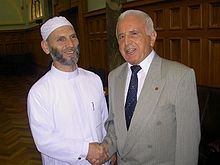
New Zealand has several mosques and Islamic centres and trusts in the major centres, and two Islamic schools (Al Madinah and Zayed College for Girls) in Auckland. Auckland alone has about 15 Islamic centres, mosques, and trusts.
Organisations
The Federation of Islamic Associations of New Zealand (FIANZ) is the national umbrella organisation that represents the Muslim community in New Zealand. FIANZ is affiliated with seven regional organisations, trusts, and most mosques and Islamic centres in New Zealand. FIANZ was founded in April 1979 by Mazhar Krasniqi, who brought together the three regional Muslim organisations of Canterbury, Wellington and Auckland. He was honoured for his efforts by the New Zealand government in 2002, receiving a Queens Service Medal.
Later Hajji Ashraf Choudhary served as president (1984–85) before pursuing a political career and entering the New Zealand Parliament in 1999. (However, Choudhary would separate his religion from politics, in line with New Zealand secularism). In 2008, FIANZ established the Harmony Awards "as part of Islam Awareness Week to recognise the contributions of New Zealanders to improving understanding and relationships between Muslims and the wider community".
The FIANZ is affiliated with seven regional associations including the New Zealand Muslim Association (NZMA), the South Auckland Muslim Association (SAMA), the Waikato Muslim Association (WMA), the Manawatu Muslim Association (MMA), the International Muslim Association of New Zealand (IMAN), the Muslim Association of Canterbury (MAC), and the Otago Muslim Association. Other Muslim organisations have included the predominantly Fijian Indian Anjuman Himayat al-Islam, the University of Otago's Muslim Student Association (MUSA), the Ahmadiyya Jama'at New Zealand, and the Southland Muslim Association.
Demography
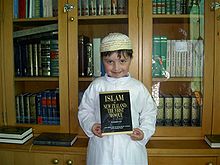
The number of Muslims in New Zealand according to the 2018 census is 57,276, up 24% from 46,149 in the 2013 census. The majority of New Zealand Muslims are Sunnis but there is a large number of Shias who live in New Zealand, concentrated mainly in Auckland (the largest city of New Zealand). In recent years Shia Muslims have become active holding Ashura commemoration programmes in Auckland parks. The first of these was conducted by the Fatima Zahra Charitable Association on 19 January 2008.
There are significant communities of Muslims from the Middle East (Turkey and Lebanon), South Asia (Pakistan, India and Bangladesh) and Southeast Asia. There is also a large Indo-Fijian Muslim community and an equally substantial Somali minority in New Zealand. Contrary to popular assertions from various community leaders, no one single ethnic group can claim to contribute more than half of the New Zealand Muslim population. The majority of Muslims in New Zealand are concentrated in the major cities of Auckland, Hamilton, Wellington, and Christchurch.
From the mid-1990s, an influx of Malay students from Malaysia and Singapore has increased the proportion of Muslims in some other centres, notably the university city of Dunedin. Dunedin is home to a mosque called Al-Huda mosque, which is run by the Otago Muslim Association. As of 2019, the southernmost mosque in New Zealand is the Southland Muslim Association Masjid/Community Centre in Invercargill.
Māori Muslims
Main article: Māori MuslimsIslam was estimated to be the fastest growing religion among the Māori, however recently there is only a growth of 39 individuals in 12 years between 2006 and 2018. Census figures showing the number of Muslims of Māori ethnicity increasing from 99 to 708 from 1991 to 2001. The Māori Muslim population thereafter virtually stabilised from 1,077 in 2006 to 1,083 in 2013 to 1,116 in 2018. Te Amorangi Izhaq Kireka-Whaanga, leader of the Aotearoa Maori Muslim Association, views tino rangatiratanga as a form of jihad, and Islam as "the perfect vehicle for Māori nationalism". The leader of the AMMA, Sheikh Eshaq Te Amorangi Morgan Kireka-Whaanga was identified in 2010 among the top 500 most influential Muslims. In 2004 Sheikh Eshaq led the Quran Tilawat at the "National Islamic Converts Conference" at the Canterbury mosque in Christchurch. The Ahmadiyya Community has translated the Qur'an into the Māori language, Te Reo.
Pacific Islanders
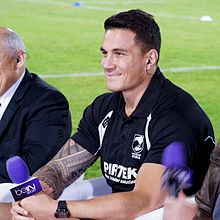
While New Zealand's overall Pacific Islander community grew 15% according to census data from 2001 to 2006, Muslim Pacific Islanders grew 87.43%. According to 2013 census data, there were 1,536 Muslims among the Pacific islander community (a little under 3.5% of New Zealand's Muslim population). It increased to 1,866 Muslims in 2018.
One Muslim from this community is a rugby player and heavyweight boxer, Sonny Bill Williams, as well as fellow All Black player Ofa Tu'ungafasi.
Europeans
According to 2013 census data, there were 4,353 Muslims (about 9.5% of the total Muslim population) among the European community (Pākehā). It decreased to 3,693 Muslims in 2018 Census.
Issues
Muhammad cartoons controversy
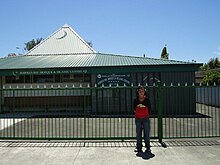
In 2006, two newspapers in New Zealand decided to republish controversial Danish cartoons depicting Muhammad, the prophet of Islam. The Muslim community registered its displeasure through press statements and a small peaceful march in Auckland. The editors said they did not mean offence but would not back down. Prime Minister Helen Clark and opposition leader Don Brash both made statements that the cartoons were not appreciated if they deeply offended members of the New Zealand community, but that such decisions were for editors to make, not politicians. Muslim leaders and the editors got together with the Race Relations office, and Jewish and Christian representatives in Wellington. As a result of this meeting the editors said they would not apologise but in good faith would refrain from publishing the offending images again. The New Zealand Muslim leadership, through the Federation of Islamic Associations of New Zealand (FIANZ), then proceeded in good faith to consider the matter closed, and drafted letters to 52 Muslim countries reversing their earlier stance and asking that New Zealand products not be boycotted.
Further controversies
In November 2016, Mohammad Anwar Sahib, the Imam of the Al-Taqwa mosque in Manukau, Auckland and a religious adviser to the FIANZ, drew controversy when he made offensive remarks about Jews, Christians, and women in a series of speeches that were posted by the right-wing blogger Cameron Slater on YouTube. Sahib's comments were condemned by a wide range of figures and groups in New Zealand society including the FIANZ's President Hazim Arafeh, the Islamic Women's Council of New Zealand (IWCNZ), the Race Relations Commissioner Dame Susan Devoy, the Ethnic Communities Minister Sam Lotu-Iiga, the ACT party David Seymour, the New Zealand First leader Winston Peters, the New Zealand Jewish Council, and the Ahmadiyya community. In response to negative publicity, Sahib was dismissed from his advisory position at the FIANZ. Sahib denied accusations of racism and issued a statement claiming his statements had been taken out of context.
In late October 2017, it was reported in the media that the first secretary of the Iranian Embassy Hormoz Ghahremani, the visiting Iranian cleric Hojatoleslam Shafie, and community elder Sayed Taghi Derhami had made remarks denying the Holocaust and attacking Israel at the Shia Islamic Ahlulbayt Foundation in Pakuranga, Auckland during a meeting to commemorate Quds Day in June. A video of the speeches had been posted on the Foundation's YouTube channel. These remarks were criticised by the New Zealand Jewish Council and the pro-Israel think tank the Israel Institute of New Zealand, who advocated Ghahremani's expulsion. Ghahremani later clarified that his actions represented the Iranian government's official position on Israel. Race Relations Commissioner Devoy also condemned the trio's anti-Semitic statements. The opposition New Zealand National Party's foreign affairs spokesperson Gerry Brownlee also urged the incumbent Labour-New Zealand First-Green coalition government to expel Ghahremani. In response, Foreign Minister Winston Peters countered that the incident had occurred under the previous National government's watch. Peters indicated that the Ministry of Foreign Affairs and Trade had summoned Ghahremani to express its disapproval.
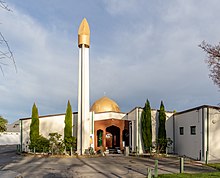
Christchurch mosque shootings
Main article: Christchurch mosque shootings See also: IslamophobiaOn 15 March 2019, a terrorist attacked worshippers at two mosques in Christchurch, killing 51 people, including 42 at the Al Noor Mosque in Riccarton, 7 at the Linwood Islamic Centre, and 2 who died in hospital. The attacks took place on a Friday afternoon, when worshippers inside the mosques were gathering for Jumu'ah. The accused perpetrator of the attack was an Australian described as a white supremacist who intended to create an "atmosphere of fear" against Muslims.
However, a week after the attack, a nationwide moment of silence was observed in New Zealand on Friday – ushered in by the Muslim call to prayer. The prayer and two-minute reflection were broadcast live on national media outlets and came as an estimated 20,000 people, including Prime Minister Jacinda Ardern, gathered metres from the Al Noor mosque in the city of Christchurch for Muslim Friday prayers. Gamal Fouda, an imam who survived the attack at Al Noor mosque, said "last Friday I stood in this mosque and saw hatred and rage in the eyes of the terrorist, but today from the same place I look out and I see the love and compassion in the eyes of thousands of New Zealanders and human beings from around the globe". Speaking to mourners in the crowd, Prime Minister Ardern said "New Zealand mourns with you. We are one". Quoting Muhammad, she said: "The believers in their mutual kindness, compassion, and sympathy are just like one body. When any part of the body suffers, the whole body feels pain." The horrific bloody event was condemned worldwide. New Zealand businesses and the community have come together to combat discrimination among Muslims.
Queenstown mosque vandalism
On 23 December 2020, six posters depicting Muhammad taken from the French satirical magazine Charlie Hebdo and hostile messages were plastered on the Queenstown Islamic Centre, which had opened on 11 December. The Mayor of Queenstown-Lakes Jim Boult condemned the incident and apologised on behalf of Queenstown to the Muslim community. An 18-year-old teenager was subsequently arrested in connection to the incident and also charged with possessing a knife.
2024 email threat against Muslim schools
On 9 September 2024, two Muslim schools Al-Madinah School and Zayed College in Mangere, Auckland went into lockdown after receiving an email threat. The email featured a video of man showing guns in a car and randomly shooting. A third Auckland Muslim school Iqra primary school restricted access as a safeguard. Federation of Islamic Associations of New Zealand spokesperson Abdur Razzak said the email video threat brought back memories of the Christchurch mosque shootings in 2019 and urged the National-led government to reconsider its policies of downscaling the previous Labour-led government's national security settings and firearms legislation.
Notable New Zealand Muslim figures
Main category: New Zealand Muslims- Abdul Rahim Rasheed, activist.
- Ahmed Bhamji, politician and businessman.
- Ajaz Patel, Indian-born New Zealand cricketer
- Anjum Rahman, community leader and human rights activist.
- Ashraf Choudhary, politician.
- Atta Elayyan was a Jordanian-New Zealand futsal player, coach, businessman, and developer. As a futsal player, Elayyan played on the New Zealand national futsal team and coached for the Christchurch Boys' High School. As a businessman and developer, he founded several businesses including Lazyworm Applications and LWA Solutions. He was murdered in the Christchurch mosque shootings.
- Ibrahim Omer was a Member of Parliament for the Labour Party from 2020 to 2023.
- Joel Hayward, scholar, writer and poet. Kirkus Reviews said that Hayward "is undeniably one of academia’s most visible Islamic thinkers". The National newspaper called Hayward "eminent' and a "distinguished historian of warfare and military strategy". He is considered to be one of "the world’s five hundred most influential Muslims," with his listing in the 2023, 2024 and 2025 editions of The Muslim 500 stating that "he weaves together classical Islamic knowledge and methodologies and the source-critical Western historical method to make innovative yet carefully reasoned sense of complex historical issues that are still important in today’s world."
- Mazhar Krasniqi was a New Zealand Muslim and Albanian community leader of Kosovar Albanian descent, businessman and human rights activist. He was both the first president of the New Zealand Albanian Civic League and Federation of Islamic Associations of New Zealand (FIANZ).
- Naila Hassan, police officer.
- Ofa Tu'ungafasi, rugby player.
- Omar Slaimankhel, former professional rugby footballer
- Sonny Bill Williams is a heavyweight boxer, and a former professional rugby league and rugby union player. He is only the second person to represent New Zealand in rugby union after first playing for the country in rugby league, and is one of only 43 players to have won the Rugby World Cup twice.
-
 Ofa Tu'ungafasi is an All Black Rugby Union player born in Tonga.
Ofa Tu'ungafasi is an All Black Rugby Union player born in Tonga.
-
 Joel Hayward is a New Zealand Islamic scholar born in Christchurch.
Joel Hayward is a New Zealand Islamic scholar born in Christchurch.
-
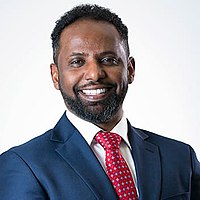 Ibrahim Omer, born in Eritrea, is a former member of Parliament for the Labour Party.
Ibrahim Omer, born in Eritrea, is a former member of Parliament for the Labour Party.
-
 Sonny Bill Williams is a Muslim heavyweight boxer and former rugby player born in Auckland.
Sonny Bill Williams is a Muslim heavyweight boxer and former rugby player born in Auckland.
See also
References
- ^ Drury, Abdullah (31 October 2020). "Wish You Were Here; A Short History of New Zealand Muslims and Integration". Nazhruna: Jurnal Pendidikan Islam. 3 (3): 355–370. doi:10.31538/nzh.v3i3.1021.
- "Muslims in New Zealand". Centre for Applied Cross-cultural Research. Retrieved 15 March 2019.
- "Totals by topic for individuals, (NZ total), 2013, 2018, and 2023 Censuses". Statistics New Zealand. Retrieved 13 October 2024.
- "Prayers for Opening". Stuff.co.nz. 31 October 2013. Archived from the original on 13 August 2018. Retrieved 4 March 2014.
- "Koran's message of unity shared in te reo translation". The New Zealand Herald. 14 April 2010. Retrieved 6 January 2019.
- ^ Shepard, William (December 2006). "New Zealand Muslims and their Organisations" (PDF). New Zealand Journal of Asian Studies. 8: 44.
- van der Krogt, Christopher (1996). "14. Islam" (PDF). In Donovan, Peter (ed.). Religions of New Zealanders (2. ed.). Palmerston North: Dunmore Press. p. 191. ISBN 0864692625. Archived from the original on 26 May 2023. Retrieved 26 May 2023.
According to the 1991 census, there were 5,772 Muslims in New Zealand on 5 March of that year.
{{cite book}}: CS1 maint: bot: original URL status unknown (link) - ^ "Kiwi converts among New Zealand's Muslim community". Stuff. Retrieved 25 November 2015.
- "2013 Census QuickStats about culture and identity – tables". Statistics New Zealand. 15 April 2014. Archived from the original on 24 May 2014. Retrieved 18 July 2015.
- ^ "2018 Census totals by topic – national highlights". Stats NZ. Archived from the original on 23 September 2019. Retrieved 24 October 2019.
- Drury, Abdullah (March 2015). "Mostly Harmless". Waikato Islamic Studies Review. 1 (1): 30.
- ^ Kolig 2010, p. 21.
- Drury, Abdullah (25 September 2007). "Crucial element locked in past". The New Zealand Herald. Archived from the original on 23 October 2012. Retrieved 23 March 2019.
- Wong, Pansy. "New Zealand, Trade and the Muslim World Forum Speech". Beehive.govt.nz. New Zealand Government. Archived from the original on 9 June 2011. Retrieved 23 March 2019.
- Kolig 2010, pp. 22–23.
- Kolig 2010, p. 23.
- Kolig 2010, pp. 23–25.
- Veitch, James; Tinawi, Dalia. "Middle Eastern peoples – Other Middle Eastern peoples". Te Ara – The Encyclopedia of New Zealand. Retrieved 25 March 2019.
- Kolig 2010, pp. 30, 33–34.
- "History of Al-Madinah". Al-Madinah School. Retrieved 25 March 2019.
- "About the School". Zayed College for Girls. Archived from the original on 25 March 2019. Retrieved 25 March 2019.
- Kolig 2010, pp. 30–31.
- Drury, Abdullah (11 July 2006). "Home country doctrine splits once-unified local Muslims". The New Zealand Herald. Archived from the original on 4 March 2016. Retrieved 25 March 2019.
- ^ "About FIANZ". Federation of Islamic Associations of New Zealand. Archived from the original on 25 March 2019. Retrieved 25 March 2019.
- "Choudhary, Ashraf". www.parliament.nz. New Zealand Parliament. Retrieved 16 November 2019.
- Ali, Abdulrahim; Thiam, Iba Der; Talib, Yusof A. (2016). The Different aspects of Islamic culture, v. 6, pt. II: Islam in the World today; Islam and the Muslim world today. UNESCO. p. 435. ISBN 978-92-3-100133-8. Retrieved 16 November 2019.
- "Islam Awareness Week will be held from 4–10 August 2008 – Strong Families – Better Society". www.islamawareness.co.nz. Archived from the original on 9 August 2008.
- Kolig 2010, pp. 32–33.
- "Our Community". Ahmadiyy Muslim Jama'at. Retrieved 25 March 2019.
- ^ "Inside the world's southernmost mosque". Otago Daily Times. 1 January 2018. ISSN 0114-426X. Archived from the original on 23 March 2019. Retrieved 20 March 2019.
the Southland Muslims Association bought a small industrial building in the sleepy Invercargill suburb of Hawthorndale and in 2010 opened a permanent masjid, or mosque, and community centre to serve around 80 Muslim families in the region.
- Kolig 2010, pp. 43–46.
- "New Zealand Takes Ashura Outside for the First Time". Fatima Zahra Charitable Association. 20 January 2008. Archived from the original on 17 July 2018. Retrieved 23 March 2019.
- "About Otago Muslim Association". Otago Muslim Association. Archived from the original on 23 March 2019. Retrieved 23 March 2019.
- "Al Huda Mosque". Otago Muslim Association. Archived from the original on 23 March 2019. Retrieved 23 March 2019.
- Searle, Jamie (22 March 2019). "Attack brings country together like nothing else has, Invercargill mayor Sir Tim Shadbolt says". Stuff.co.nz. Retrieved 23 March 2019.
- Bhandari, Neena (16 March 2009). "NEW ZEALAND: Asian Muslims Tell Their Own Stories". Retrieved 10 March 2017.
- ^ Onnudottir, Helena; Possamai, Adam; Turner, Bryan (2012). "Islam and Indigenous Populations in Australia and New Zealand". Muslims in the West and the Challenges of Belonging: 60–86. Retrieved 10 March 2017.
- "Religious affiliation" Archived 19 November 2011 at the Wayback Machine, Table Builder, Statistics New Zealand
- Ruth Berry, Peters claims Muslim group funding radical in The New Zealand Herald (aa August 2005)
- "Newzealand 2018 Census". Retrieved 14 May 2020.
- Hume, Tim (17 October 2004). "Muslim faith draws converts from NZ prisons (radical New Zealand Maori embrace jihad)". Stuff.co.nz. Archived from the original on 27 October 2004.
- "The 500 Most Influential Muslims – 2010" by The Royal Islamic Strategic Studies Centre (Amman, 2010), page.123.
- "Koran's message of unity shared in te reo translation". The New Zealand Herald. 14 April 2010. Retrieved 6 January 2019.
- "Newzealand 2018 Census". Retrieved 14 May 2020.
- "Sonny Bill Williams embraces Islam", Carolyne Meng-Yee, NZ Herald
- "Newzealand 2018 Census". Retrieved 14 May 2020.
- ^ Zwartz, Barney (6 February 2006). "Cartoon rage spreads to New Zealand". The Age. Archived from the original on 7 November 2017. Retrieved 3 November 2017.
- "Papers sorry for cartoons' offence". The New Zealand Herald. 9 February 2006. Archived from the original on 7 November 2017. Retrieved 3 November 2017.
- Palmer, Scott; Marbeck, Brian (22 November 2016). "'Hate Speech' Imam made a 'mistake' – FIANZ". Newshub. Archived from the original on 5 November 2017. Retrieved 4 November 2017.
- ^ Bath, Brooke (22 November 2016). "Auckland Imam demands apology after backlash from anti-Semitic speeches". Stuff.co.nz. Archived from the original on 7 November 2017. Retrieved 4 November 2017.
- "Dismissed Sheikh still in charge of At-Taqwa Mosque: A cause for concern". Shalom.Kiwi. Archived from the original on 7 November 2017. Retrieved 4 November 2017.
- Martin, Hannah (23 November 2016). "Auckland Imam permanently stood down after anti-Semitic speeches". Stuff.co.nz. Archived from the original on 5 November 2017. Retrieved 4 November 2017.
- Wall, Tony (29 October 2017). "Calls to expel Iran diplomat from NZ after fiery anti-Israel speech 'fuels radicalism'". Stuff. Archived from the original on 5 November 2017. Retrieved 4 November 2017.
- "Complaints laid after 'hate speech' calling Israel 'cancer', denying Holocaust". Newshub. 30 October 2017. Archived from the original on 5 November 2017. Retrieved 4 November 2017.
- Devoy, Susan (31 October 2017). "'This is who we do not want to ever become': Dame Susan Devoy on anti-Semitism in New Zealand". The Spinoff. Archived from the original on 7 November 2017. Retrieved 4 November 2017.
- Jones, Nicholas (3 November 2017). "Expel 'hateful Iranian diplomat: National". The New Zealand Herald. Archived from the original on 3 November 2017. Retrieved 4 November 2017.
- Kirk, Stacey (3 November 2017). "Opposition calls on Foreign Minister Winston Peters to expel 'hateful' Iranian diplomat". Stuff. Archived from the original on 7 November 2017. Retrieved 4 November 2017.
- "Masjid An-Nur in Riccarton, Canterbury". www.salatomatic.com. Salatomatic – your guide to mosques & Islamic schools. Retrieved 17 August 2017.
- "49 killed in mass shooting at two mosques in Christchurch, New Zealand". CNN. 15 March 2019. Archived from the original on 15 March 2019. Retrieved 16 March 2019.
- "Far-right ideology detailed in Christchurch shooting manifesto". The Guardian. 15 March 2019. Archived from the original on 15 March 2019. Retrieved 16 March 2019.
- "'We are one' – Prime Minister Jacinda Ardern's words before moment of silence". TVNZ. Archived from the original on 24 March 2019. Retrieved 24 March 2019.
- Wisker, Zazli Lily Lily (2023). "Inclusive marketing: Muslims' influence on marketers' behaviour in non-Muslim majority country: Evidence from New Zealand". Journal of Islamic Marketing. 14 (12): 3208–3227. doi:10.1108/JIMA-08-2022-0238. S2CID 257290313.
- Satherley, Dan; McCarron, Heather (23 December 2020). "Queenstown Mayor Jim Boult horrified by an incident in brand new mosque". Newshub. Archived from the original on 22 December 2020. Retrieved 25 December 2020.
- "Teen arrested after offensive posters put up near Queenstown Islamic Centre". 1News. 24 December 2020. Archived from the original on 23 December 2020. Retrieved 25 December 2020.
- "Auckland Muslim schools in lockdown after threat". RNZ. 9 September 2024. Archived from the original on 9 September 2024. Retrieved 9 September 2024.
- "Capital painted red: Clean sweep for Labour in Wellington". The Dominion Post. 17 October 2020. Retrieved 17 October 2020.
- "Election 2020: The 40 diverse new MPs entering Parliament". Newstalk ZB. 18 October 2020. Retrieved 24 October 2020.
- "A well-researched and applicable analysis of Muhammad's leadership". Kirkus Reviews. Retrieved 4 November 2021.
- How New Zealand born Joel Hayward became One of the World's 500 Most influential Muslims. The National. 26 November 2022. Retrieved 26 November 2022.
- The Muslim 500: The World's 500 Most Influential Muslims 2023. 26 October 2022. Retrieved 30 October 2023.
- The Muslim 500: The World's 500 Most Influential Muslims 2025, p. 158 (PDF). Retrieved 7 October 2024.
- "Former All Blacks centre Sonny Bill Williams turns focus to boxing". 10 March 2021.
Further reading
- Kolig, Erich (2010). New Zealand's Muslims and Multiculturalism. Leiden: Brill. ISBN 9789004178359. Retrieved 25 March 2019.
- Shepard, William (1982). "Muslims in New Zealand". Journal of Muslim Minority Affairs. 4 (1 & 2). Institute of Muslim Minority Affairs: 63. doi:10.1080/02666958208715860.
- Drury, Abdullah. "Mahometans on the Edge of Colonial Empire: Antipodean Experiences," Islam and Christian–Muslim Relations, Volume 29, 2018 - Issue 1, pp. 71–87. (https://www.tandfonline.com/doi/abs/10.1080/09596410.2017.1384230)
External links
| Religion in New Zealand | |
|---|---|
| Islam in Oceania | |
|---|---|
| Sovereign states | |
| Associated states of New Zealand | |
| Dependencies and other territories | |
